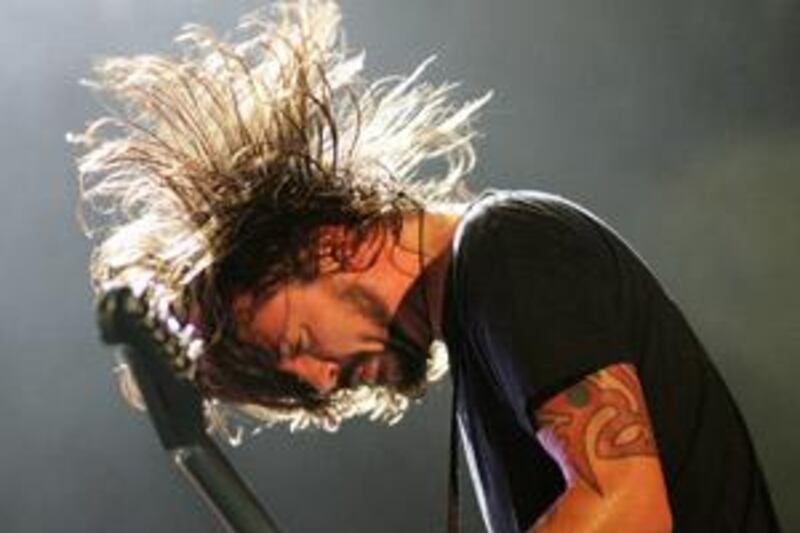Three men take the stage at the 1,100 capacity Metro club on the Northside of Chicago to shrieks of frenzied excitement. But these guys aren't hungry young wannabes. With one aged 63 and the other two pushing 40, they're more like hardened rock veterans. Still, tickets for this August 9 debut show sold out in three minutes. Them Crooked Vultures are an amalgam of the Foo Fighters frontman and ex-Nirvana drummer Dave Grohl, Queens of The Stone Age's Josh Homme and, crucially, John Paul Jones, the bass player from the legendary rock band Led Zeppelin. It is John Paul Jones's presence that has made this much-talked-about supergroup a reality. Homme and Grohl are both huge Zeppelin fans.
"Dave Grohl would like to be [the late Led Zeppelin drummer] John Bonham," says the Q magazine contributing editor Mark Blake. "When Led Zeppelin played the O2 Arena in London in December 2007, Grohl hired a van and took all his friends to see them. The fact that his own band were playing there a few weeks later didn't have any bearing on it. He is a superfan." Them Crooked Vultures plan to release an album, Never Deserved The Future, on October 23. But they are by no means the only supergroup currently in operation. There's Tinted Windows (which features ex-members of Fountains of Wayne, Hanson and The Smashing Pumpkins); Dead Weather (Jack White of the White Stripes and members from The Kills and Greenhornes); Chicken Foot (Van Halen and the Red Hot Chili Peppers) and the Monsters of Folk (singer-songwriters Conor Oberst and Mike Ward). But why so many all of a sudden?
"It fits the times," said Blake. "The internet has allowed artists to collaborate by exchanging files when they are not even in the same city. They can make music quickly and get it out quickly. It encourages talented musicians to work together." "Consumers now understand that bands aren't so fixed, careers are more haphazard, the album/tour cycle doesn't work anymore," said John Mulvey, deputy editor of Uncut magazine. "Musicians have to try different things to stay financially viable. Damon Albarn has his supergroup (The Good The Band and The Queen with ex-members of The Clash and The Verve), his animated band (Gorillaz), his Britpop revival (Blur) and various World music opportunities. He has a basket of careers. The White Stripes' Jack White is a similar figure. This is the new model for talented musicians."
Still these collaborations were not always such a flexible, lightweight concept. When, in 1969, a supergroup formed around the formidable talents of Eric Clapton, Ginger Baker and Stevie Winwood, the manager Robert Stigwood, who also handled the Bee Gees, said it was a band to change the world. But after just one album and tour, Blind Faith fizzled out. Since then, music fans have eyed supergroups with suspicion.
Still, when the album was in commercial ascendancy in the 1970s, so were supergroups. Some, such as Cream and Crosby, Stills, Nash and Young, were creatively thrilling. Others, such as Emerson Lake and Palmer and Asia, were commercial juggernauts. A third group, such as Ringo Starr's All Starr Band (which featured Joe Walsh from the Eagles, Dr John and Cream's Jack Bruce among others) were just awful.
Talented malcontents in the music business couldn't see a band without wanting to join it. Eric Clapton formed Blind Faith and played with a number of other musicians. Another restless virtuoso, the ex-Smiths guitarist Johnny Marr, did the same in the 1990s, forming Electronica with Bernard Sumner of New Order, as well as playing guitar for The The, The Pretenders and most recently Modest Mouse. But for sheer superstar wattage, none will ever beat The Travelling Wilburys. "To land a Beatle in your supergroup is about as good as it gets" says Mark Blake. "To get Dylan and Roy Orbison too is a legends-only line up." The band, which also included Jeff Lynne (ELO) and Tom Petty, enjoyed several hits before Orbison died in 1988.
The history of pop music is littered with similar corpses. Time magazine described supergroups as a "potent but short-lived" phenomenon. "If you have that many egos in one supergroup, it's doomed" said Blake. "With Emerson Lake and Palmer, they each had their own truck to carry their kit to shows. The drummer needed a solo, the bass player had his own Persian rug. There is no happy-go-lucky Ringo to balance the egos. Usually, the band implodes."
By 1976 and with the advent of punk, the supergroup seemed finished, but since then, attitudes have mellowed. The supergroup is now accepted by audience and artist as a one-off "project" and promoted in a low key way. It's telling that Them Crooked Vultures, a rare example of an intergenerational supergroup, decided to eschew splashy venues in New York, Los Angeles or London for their musical debut. Instead, they chose humble Chicago, a blue-collar city famous for its love of live music.
But while the modern supergroup may be unassuming, warns Mulvey, they are also becoming unavoidable. "There will be much, much more. It will be fairly endless actually," he says.





